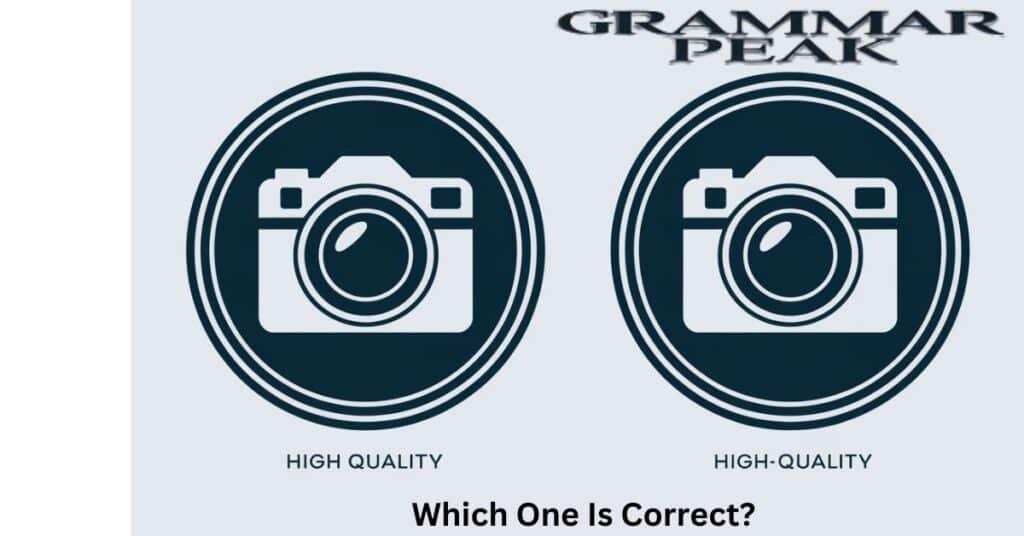In the realm of English language usage, some may stumble over the debate between “High Quality” and “High-Quality”. Do they mean the same thing? Is there a correct time and place to use each one? This article aims to clarify these nuances, offering writing precision and enhancing your writing professionalism.
The question of “High Quality” versus “High-Quality” arises from a common source of confusion: hyphen usage in writing. The answer lies in understanding the difference between a noun phrase and a compound adjective.
Why is There Confusion?
The confusion between “High Quality” and “High-Quality” primarily arises from the varied use of hyphens in English grammar. Hyphens play a crucial role in forming compound adjectives – phrases that combine two or more words to describe a noun.
As English language users, we often overlook the nuances of hyphen usage, leading to uncertainty about when it’s appropriate to use a hyphen. Consequently, “High Quality” and “High-Quality” are frequently used interchangeably, despite their different grammatical functions.
The correct usage of these terms is dictated by context and sentence structure. Understanding these factors is key to eliminating confusion and ensuring our writing meets the highest standards of grammar precision and writing clarity.
you will like High Quality or High-Quality: Which One Is Correct?
What Does “High Quality” Mean?
In English language usage, “High Quality” without a hyphen is typically used as a noun phrase. It describes the superior excellence or the exceptional standard of something. This term is often used in a sentence where the level or standard of quality of an object or service needs to be described.
Understanding the correct usage and context of “High Quality” in your writing enhances its precision and clarity. It allows you to effectively communicate the superior standards and excellence of the subject you’re describing. Recognizing “High Quality” as a noun phrase and using it correctly can significantly elevate your writing proficiency.
What Does “High-Quality” Mean?
In contrast to “High Quality”, “High-Quality” with a hyphen is used as a compound adjective. This grammatical structure serves to describe the quality of a noun directly, prior to the noun it modifies.
For instance, in the sentence, “That is a high-quality painting,” the term “high-quality” directly describes the painting. The use of “high-quality” as a compound adjective adds writing precision and contextual grammar usage to your sentence, specifying that the painting itself is of superior or excellent quality.
must be read High Quality or High-Quality: Which One Is Correct?
“High Quality” vs “High-Quality”
The key difference between “High Quality” and “High-Quality” lies in their grammatical function. The former is a noun phrase, while the latter is a compound adjective. Their usage depends on the sentence structure and what you intend to describe.
When to Use “High Quality”
Use “High Quality” as a noun phrase when describing the standard or level of excellence.
For example,
“The craftsmanship of this furniture is of high quality.”
“High quality” refers to the superior standards of the furniture’s craftsmanship.
When to Use “High-Quality”
Use “High-Quality” as a compound adjective when directly describing a noun.
For example,
“She only uses high-quality materials for her designs.”
“High-quality” directly describes the materials.
The Key Difference
The key difference lies in their grammatical roles. “High Quality” is a noun phrase, while “High-Quality” is a compound adjective.
| High Quality | Low Quality | |
| Definition | Refers to products, services, or features that surpass average standards or expectations. | Refers to products, services, or features that fall below average standards or expectations. |
| Perception | Often perceived as reliable, durable, and worth the investment. | Often perceived as unreliable, less durable, and less valuable. |
| Price | Generally, high-quality items are more expensive due to the higher costs associated with better materials, skilled labor, and quality assurance processes. | Typically, low-quality items are less expensive. They are often made with cheaper materials, less skilled labor, or lack comprehensive quality assurance. |
| Impact on Brand Reputation | High-quality products or services enhance brand reputation, fostering customer loyalty and positive word-of-mouth. | Low-quality products or services can damage a brand’s reputation, leading to customer dissatisfaction and negative reviews. |
| Long-Term Cost Effectiveness | While initial costs may be higher, high-quality items often prove more cost-effective in the long run due to their longevity and reliability. | Low-quality items may incur more costs over time due to frequent replacements or repairs, making them less cost-effective in the long run. |
Synonyms for “High Quality” and “High-Quality”
To enhance your vocabulary and avoid repetition, consider using synonyms for both “High Quality” and “High-Quality”. These can range from “superior excellence” and “premium quality” to “first-rate craftsmanship”.
Synonyms for “High Quality” (noun phrase)
- Superiority – It implies the highest quality compared to others. Example: The superiority of their software design is widely recognized.
- First-rate – This describes something that is top-tier or best-in-class. Example: Their first-rate customer service sets them apart from competitors.
- Fineness – This suggests a high degree of quality, especially in detail. Example: The fineness of the craftsmanship is evident in the product’s intricate details.
- Distinction – It refers to something of high quality that stands out. Example: The hotel’s distinction lies in its unparalleled hospitality.
- Premium – This signifies something of higher than usual quality. Example: The restaurant uses only premium ingredients in its dishes.
- Prestige – This word connotes high status or quality. Example: The prestige of this university is known worldwide.
- Superbness – This term implies something of excellent quality. Example: The superbness of the performance left the audience in awe.
- Eminence – This describes something that is of high quality and respected. Example: The eminence of their research work is globally recognized.
- Supremacy – It signifies the highest degree of quality or performance. Example: The team’s supremacy was clear in their flawless execution.
- Top-notch – This refers to the highest quality or standards. Example: The company provides top-notch services to all its clients.
Synonyms for “High-Quality” (adjective)
- Superior – This implies that the quality of the item or service is above average. Example: She only uses superior materials in her designs.
- First-class – This term describes something that is the best of its kind. Example: They offer first-class amenities to their guests.
- Top-tier – This suggests that the item or service is among the best available. Example: The top-tier software offers numerous advanced features.
- Elite – This term is used to describe a high level of quality or excellence. Example: He is an elite athlete.
- Premium – This term describes something that is of higher than usual quality. Example: They serve premium coffee at their café.
- Exceptional – This describes something that has an unusually high level of quality. Example: The exceptional attention to detail makes this artwork standout.
- Outstanding – This term suggests something that stands out due to its high quality. Example: She has an outstanding record of academic achievements.
- Unparalleled – This term denotes something that is unmatched in its quality. Example: The unparalleled beauty of this location attracts tourists from around the world.
- Exquisite – This describes something that is extremely beautiful and of high quality. Example: The exquisite design of the jewelry caught everyone’s eye.
- Pristine – This term describes something in its original condition, of high quality. Example: The pristine condition of the vintage car made it highly valuable.
Examples in Context
To fully grasp the usage of “High Quality” and “High-Quality”, let’s look at some contextual examples.
Examples of “High Quality” (Noun Phrase)
- The car manufacturer is acclaimed for the production of vehicles that are of high quality.
- They only sell products that meet their high quality standards.
- The university is renowned for its high quality of education.
- The company stands out due to its consistent delivery of services of high quality.
- The tailor uses fabrics of high quality to ensure customer satisfaction.
- The artist uses paints of high quality to create his masterpieces.
- The restaurant is famous for its high quality of food and service.
- The software developer prides himself on producing applications of high quality.
- The jewelry store guarantees that every gem sold is of high quality.
- The conference attracted experts of high quality from around the globe.
Examples of “High-Quality” (Adjective)
- The designer is recognized for her high-quality fashion creations.
- The bakery is known for its high-quality pastries, made fresh daily.
- The computer company’s high-quality products are popular among professionals.
- The hotel’s high-quality service ensures a comfortable stay for all guests.
- The high-quality materials used in the construction ensure the building’s longevity.
- The company’s high-quality customer service sets it apart from its competitors.
- The high-quality craftsmanship of the furniture makes it a worthwhile investment.
- The high-quality education provided by the institution prepares students for a prosperous future.
- The high-quality performance of the athletes was rewarded with a standing ovation.
- The high-quality photography equipment used resulted in stunning photos.
Origins of “High Quality” and “High-Quality”
The terms “High Quality” and “High-Quality” have their roots in the English language’s penchant for precision and differentiation.
Origins of “High Quality”
The term “High Quality” stems from two separate words, “high” and “quality”. “High” is an old word with origins in Old English ‘head’, meaning at a great vertical extent, far above ground or at the top. This term has been in use since before the 12th century.
“Quality”, on the other hand, dates back to the 14th century, originating from the Latin word ‘qualitas’, which translates to “character” or “nature”. By the 1530s, “quality” was being used to describe the degree of excellence of a thing or person. When these words are combined, they form the term “High Quality”, which suggests something of superior excellence or worth
Origins of “High-Quality”
The compound adjective “High-Quality” takes its roots from the individual words “high” and “quality”. The term “high” is of Old English origin, from the word ‘heah’, which signifies ‘at a substantial height or level’. This term has been in usage since early Middle English times.
The term “quality”, on the other hand, dates back to the Middle Ages, stemming from the Latin word ‘qualitas’. This term was used to refer to a characteristic or feature of something. As early as the 1530s, the word “quality” was being used to signify the standard of something as measured against other things of a similar kind.
FAQ” S
What is the difference between “High Quality” and “High-Quality”?
The main difference lies in their grammatical function. “High Quality” is typically used as a noun phrase, while “High-Quality” is a compound adjective.
When should I use “High Quality”?
Use “High Quality” when you’re referring to the superior standard or excellence of something, typically following a preposition (e.g., “of high quality”).
When should I use “High-Quality”?
Use “High-Quality” as a compound adjective when directly describing a noun (e.g., “high-quality materials”).
Can I use “High Quality” and “High-Quality” interchangeably?
No, their usage depends on the sentence structure and what you intend to describe. Using them interchangeably can lead to grammar errors.
What are some synonyms for “High Quality” and “High-Quality”?
Synonyms for “High Quality” include superior excellence and premium quality. For “High-Quality”, alternatives include first-rate and top-notch.
Conclusion
Understanding the difference between “High Quality” and “High-Quality” can enhance your writing precision and professionalism. Remember, “High Quality” serves as a noun phrase, while “High-Quality” is a compound adjective. Use each appropriately for writing clarity and grammar precision.

Mason Blake is an experienced blogger with a passion for language and communication. With years of expertise in crafting informative and engaging content, Mason shares valuable insights on grammar and writing. His clear, concise, and reader-friendly approach has earned him a loyal following, helping readers sharpen their language skills and master the art of effective communication.








Thank you for your sharing. I am worried that I lack creative ideas. It is your article that makes me full of hope. Thank you. But, I have a question, can you help me?
I don’t think the title of your article matches the content lol. Just kidding, mainly because I had some doubts after reading the article.
I don’t think the title of your article matches the content lol. Just kidding, mainly because I had some doubts after reading the article. gate.io english
Your point of view caught my eye and was very interesting. Thanks. I have a question for you.